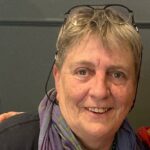 Liz Brosnan is a recovering straight-passer and psych survivor, finally coming into freedom as a queer mad dog lover! She is committed to the emergence of Mad in Ireland because her experience has taught her that finding a critical space in community with others (like Mad in America, etc) she found liberation from the oppressive mainstream: toxic capitalism, patriarchy and colonialism. She did research for her PhD in medical sociology (2013) on service user involvement in Ireland and since then had the privilege to meet wonderful people around the world making the world safer, fairer and saner for all.
Liz Brosnan is a recovering straight-passer and psych survivor, finally coming into freedom as a queer mad dog lover! She is committed to the emergence of Mad in Ireland because her experience has taught her that finding a critical space in community with others (like Mad in America, etc) she found liberation from the oppressive mainstream: toxic capitalism, patriarchy and colonialism. She did research for her PhD in medical sociology (2013) on service user involvement in Ireland and since then had the privilege to meet wonderful people around the world making the world safer, fairer and saner for all.
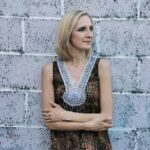 Elaine Browne is a mental health peer support worker and peer practice supervisor. Having previously worked within the Irish mental health services and been a patient within the services, Elaine believes in a different response to human suffering and crisis. Elaine set up Perspective which is a busy peer led centre in Co. Mayo in 2019 and continues the plight for changing our traditional response to mental health. She has previously been involved in setting up the Mayo hearing voices group and runs weekly peer groups, regular workshops and one to one peer support. Perspective peer support centre provides peer support to groups and people locally, nationally and abroad.
Elaine Browne is a mental health peer support worker and peer practice supervisor. Having previously worked within the Irish mental health services and been a patient within the services, Elaine believes in a different response to human suffering and crisis. Elaine set up Perspective which is a busy peer led centre in Co. Mayo in 2019 and continues the plight for changing our traditional response to mental health. She has previously been involved in setting up the Mayo hearing voices group and runs weekly peer groups, regular workshops and one to one peer support. Perspective peer support centre provides peer support to groups and people locally, nationally and abroad.
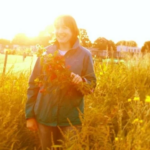 Martha Griffin is an Expert by Experience, Lecturer in Mental Health in DCU, a Peer Educator with the Dublin North, North East Recovery College. Martha has studied law and is qualified as a Community Development Worker. Martha is passionate about human rights and mental health and would like to see life after a successful mental health movement where a new paradigm and world order would reign and Martha could spend more time with her family and her garden.
Martha Griffin is an Expert by Experience, Lecturer in Mental Health in DCU, a Peer Educator with the Dublin North, North East Recovery College. Martha has studied law and is qualified as a Community Development Worker. Martha is passionate about human rights and mental health and would like to see life after a successful mental health movement where a new paradigm and world order would reign and Martha could spend more time with her family and her garden.
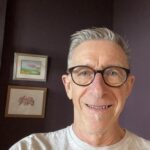 Harry Gijbels is a retired mental health nurse and academic with over 40 years’ experience in challenging reductionist and coercive mental health practices, in both the UK and in Ireland. He chaired the Board of Brent (a London Borough) Mind in the late 80’s/early 90’s. He moved to Ireland in the late 90’s and played a key role in the establishment of Sli Eile, the Critical Voices Network Ireland (CVNI), and the Hearing Voices Network Ireland (HVNI). Since 2009, he, together with Lydia Sapouna, organises an annual Critical Perspectives in Mental Health conference at University College Cork, Ireland
Harry Gijbels is a retired mental health nurse and academic with over 40 years’ experience in challenging reductionist and coercive mental health practices, in both the UK and in Ireland. He chaired the Board of Brent (a London Borough) Mind in the late 80’s/early 90’s. He moved to Ireland in the late 90’s and played a key role in the establishment of Sli Eile, the Critical Voices Network Ireland (CVNI), and the Hearing Voices Network Ireland (HVNI). Since 2009, he, together with Lydia Sapouna, organises an annual Critical Perspectives in Mental Health conference at University College Cork, Ireland
 Jennifer Hough (@jenniferhros) is passionate about helping to fundamentally change the way people think about mental health. She believes that the diagnostically-led medical model of care fails those who access it by focusing on unproven biological failings. In line with United Nations and World Heath Organisation recommendations, she wants to see an end to ‘treatment’ that places damaging labels upon people for life, and uses drug treatments as a primary course of action. She carries out this voluntary work in memory of her sister, Valerie, who was told from a very young age she had a chemical imbalance in her brain and was put on a regime of damaging psychotropic drugs for 20+ years. She hopes the information on this website will help others to heal and recover and that policy makers and the wider public will come to understand the urgent need for change.
Jennifer Hough (@jenniferhros) is passionate about helping to fundamentally change the way people think about mental health. She believes that the diagnostically-led medical model of care fails those who access it by focusing on unproven biological failings. In line with United Nations and World Heath Organisation recommendations, she wants to see an end to ‘treatment’ that places damaging labels upon people for life, and uses drug treatments as a primary course of action. She carries out this voluntary work in memory of her sister, Valerie, who was told from a very young age she had a chemical imbalance in her brain and was put on a regime of damaging psychotropic drugs for 20+ years. She hopes the information on this website will help others to heal and recover and that policy makers and the wider public will come to understand the urgent need for change.
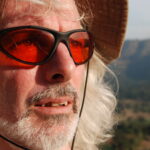 Líam Mac Gabhann is a mental health practitioner for over 25 years, with 15 years in traditional therapeutic roles as mental health nurse and counsellor. Latterly over the last 10 years his therapeutic work has broadened out from a realisation that traditional approaches are insufficient on their own in how they could help people heal from significant life challenges and trauma. This led to an exploration of and training in alternative healing approaches, such as Reiki, Shamanism, Tai Chi, Mindfulness, Systemic Family Constellations and Body Work. Liam spreads his time practicing in, providing education for and researching within mental health communities. He is dedicated to transforming dialogues in mental health communities towards the emerging globally legitimate new paradigm, that needs to displace the ineffective traditional psychiatric disenfranchising paradigm.
Líam Mac Gabhann is a mental health practitioner for over 25 years, with 15 years in traditional therapeutic roles as mental health nurse and counsellor. Latterly over the last 10 years his therapeutic work has broadened out from a realisation that traditional approaches are insufficient on their own in how they could help people heal from significant life challenges and trauma. This led to an exploration of and training in alternative healing approaches, such as Reiki, Shamanism, Tai Chi, Mindfulness, Systemic Family Constellations and Body Work. Liam spreads his time practicing in, providing education for and researching within mental health communities. He is dedicated to transforming dialogues in mental health communities towards the emerging globally legitimate new paradigm, that needs to displace the ineffective traditional psychiatric disenfranchising paradigm.
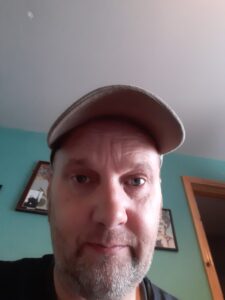 Owen Ó Tuama is a Survivor of psychiatry of over 25 years, I began hearing voices and seeing visions after third level education. I was sectioned in 1996 for five months and, like most people, had every ‘treatment’ in the book. Survivor/activist groups like IAN, HVN etc. & holistic therapy helped me recover to a large extent. I still take psychiatric medication and have periodic episodes of voices. I work for the Occupational therapy department of the Donegal Mental Health Services. I have been delivering the Dance voice and movement as a service provider for the past seven years. I have an honours degree and a masters degree in Biological Sciences.
Owen Ó Tuama is a Survivor of psychiatry of over 25 years, I began hearing voices and seeing visions after third level education. I was sectioned in 1996 for five months and, like most people, had every ‘treatment’ in the book. Survivor/activist groups like IAN, HVN etc. & holistic therapy helped me recover to a large extent. I still take psychiatric medication and have periodic episodes of voices. I work for the Occupational therapy department of the Donegal Mental Health Services. I have been delivering the Dance voice and movement as a service provider for the past seven years. I have an honours degree and a masters degree in Biological Sciences.
 Triona is a passionate community development worker that has had a fire lit inside her to change the way we as a community of people and society support one another through life’s ups and downs. Triona’s lived experience of supporting a loved one through mental health challenges which led to addiction issues has pushed her to critique the current approaches used in westernised countries that are used to support somebody in recovery from both mental health and substance use challenges (Dual Diagnosis). The journey to recovery for the individual and family members is a lonely and isolated one that can be shrouded with stigma and shame. Triona strives to be part of a movement that changes this. Most recently, Triona has been working on a project around community mobilisation to respond to Dual Diagnosis in an area of high low socio-economic class. This has led to the unfortunate realisation that a diminishing sense of community is contributing to people’s overall mental health, resulting in unhealthy ways of coping. Communities are forced to respond in a reactive manner resulting in a cycle of “firefighting”. The lack of a community wide collective response has also hindered individuals and family members’ access to appropriate integrated pathways to recovery and support creating a revolving door of care, something Triona wants to change in her new role as recovery community development officer with the Recovery Academy of Ireland.
Triona is a passionate community development worker that has had a fire lit inside her to change the way we as a community of people and society support one another through life’s ups and downs. Triona’s lived experience of supporting a loved one through mental health challenges which led to addiction issues has pushed her to critique the current approaches used in westernised countries that are used to support somebody in recovery from both mental health and substance use challenges (Dual Diagnosis). The journey to recovery for the individual and family members is a lonely and isolated one that can be shrouded with stigma and shame. Triona strives to be part of a movement that changes this. Most recently, Triona has been working on a project around community mobilisation to respond to Dual Diagnosis in an area of high low socio-economic class. This has led to the unfortunate realisation that a diminishing sense of community is contributing to people’s overall mental health, resulting in unhealthy ways of coping. Communities are forced to respond in a reactive manner resulting in a cycle of “firefighting”. The lack of a community wide collective response has also hindered individuals and family members’ access to appropriate integrated pathways to recovery and support creating a revolving door of care, something Triona wants to change in her new role as recovery community development officer with the Recovery Academy of Ireland.